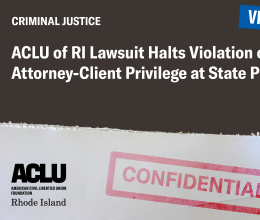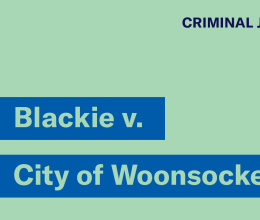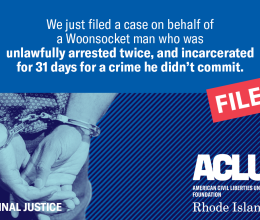Responding to an Access to Public Records Act (APRA) complaint that the ACLU of Rhode Island filed last month, the Woonsocket Police Department has released copies of its final investigations of internally-generated complaints of police misconduct that it had previously declared confidential. Last month, the ACLU had filed a formal complaint with the Attorney General when the department refused to provide the records to Dimitri Lyssikatos, a member of the Rhode Island Accountability Project. As a result of the City’s change of position, ACLU of RI cooperating attorney James Cullen is withdrawing the pending complaint.
In two major Access to Public Records Act (APRA) lawsuits filed in past years by the ACLU, the R.I. Supreme Court has ruled that the public is entitled to obtain final reports of investigations of police misconduct. Both cases happened to involve requests for reports involving citizen-generated complaints of misconduct, and a 2017 APRA advisory opinion by the Attorney General’s office, Piskunov v. Town of Narragansett, seized upon that fact to hold that the Narragansett Police Department could withhold their final reports of misconduct investigations if they were initiated internally. Until its reversal, Woonsocket had been one of only three police departments in the state the ACLU was aware of that refused to hand over these reports, relying on the Piskunov opinion.
The ACLU is presently in court suing the Pawtucket Police Department, the only other known department besides Narragansett that relies on Piskunov to keep these records of alleged misconduct secret. The complaint that the ACLU filed last month against Woonsocket had asked the Attorney General to similarly reverse his office’s 2017 decision.
In its now-moot complaint to the AG, the ACLU had argued:
“The Piskunov opinion has cast a pall over police department accountability and transparency and is being used to hinder the public’s right to know in significant ways. We request that your office take this opportunity to reconsider and reverse that pronouncement, and conclude that the text and intent of the APRA . . . compel the conclusion that internally-generated reports regarding alleged police misconduct, no less than citizen-generated reports, are public records.”
ACLU cooperating attorney Cullen said today: “I am glad that Woonsocket accepted our arguments and voluntarily produced the requested internal affairs reports. Access to public records is essential to the proper functioning of democratic government. I can think of no better example of public records that should be made public than police internal affairs reports. All such reports should be made public regardless of their origin.”
Lyssikatos added: “Woonsocket's response to my public records request was the most egregious violation of the Access to Public Records request that I have seen to date; they neglected to list a lawful reason for their denial or issue me an avenue of appeal. Although the city has now released both internal and citizen generated reports to avoid legal action, I believe that had this request been initiated by anyone unfamiliar with the public records law, the City of Woonsocket would have been successful in its violation of the law.”
ACLU of RI executive director Steven Brown said: “With the resolution of this complaint against Woonsocket, we will refocus our efforts against the Pawtucket Police Department’s unseemly secrecy. Anybody interested in government transparency should be appalled at that agency’s continued refusal to shed light on allegations of police misconduct in their department.”
Copies of the ACLU’s filings in both the Woonsocket and Pawtucket complaints can be found here.








